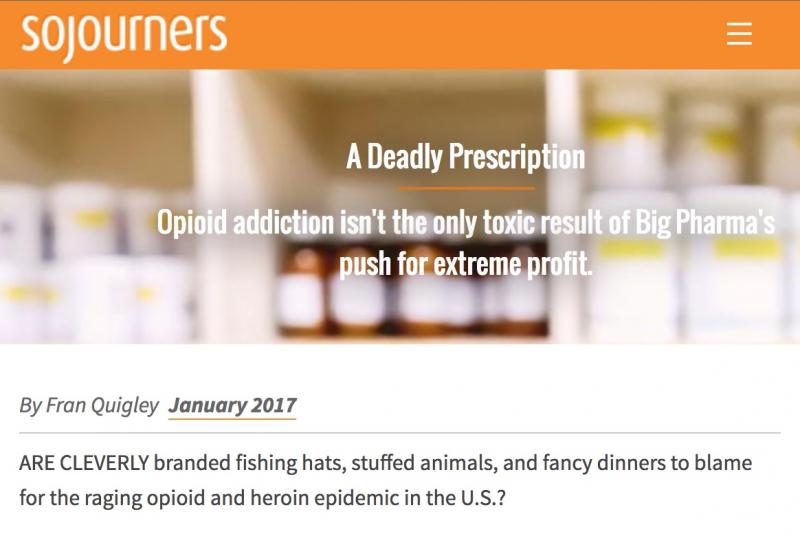
We are pleased that this week’s post for People of Faith for Access to Medicines is an article we wrote for the terrific faith and social justice-focused magazine, Sojourners. The published version of the article is online here, but a more full version, with hyperlinks to sources, is below:
Are cleverly-branded fishing hats, stuffed animals, and fancy dinners to blame for the U.S.’s raging opioid and heroin epidemic?
Most of us know the breathtaking scope of that epidemic. People are dying of overdoses at a higher rate than ever in our history, nearly 80 deaths every single day. With four of every five heroin users tracing their addiction back to opioids, many of us likely know a loved one or neighbor touched by this tragedy.
Less well known is the shockingly unethical corporate sales and lobbying blitz that helped trigger the epidemic. During the two decades when addiction rates climbed to unprecedented numbers, multiple pharmaceutical companies spent billions of dollars pushing physicians and patients into a downward spiral of painkiller over-prescription and abuse.
Corporate painkiller promotions included dinners and junkets for physicians and direct outreach to patients. One company even funded a “pain guide” that cheerfully promoted the life-changing benefits of opioids while citing multiple “disadvantages’ of over-the-counter medications like ibuprofen. At the same time, the industry was using insider ties to rewrite the medical guidelines that justified the rash of prescriptions.
The efforts paid off. In 2010 alone, physicians wrote 254 million prescriptions for opioids, and pharmaceutical corporations raked in $11 billion in opioid sales.
Multiple companies are culpable, but the most high-profile effort was Purdue Pharma’s promotion of its product OxyContin. Purdue’s marketing centered on the claim, embossed on its complementary fishing hats and plush toys, that each dose of the drug provided 12 hours of relief. The lengthy duration was the factor that distinguished OxyContin from other, cheaper alternatives.
Except the drug’s effects did not actually last that long for many patients, at least according to multiple clinical trials, patient experiences, and physician reports. When OxyContin’s effects wore off before the next scheduled dose, it created desperate patients—and what one neuropharmacologist calls “the perfect recipe for addiction.”
But Purdue Pharma resisted mightily any efforts to have the drug prescribed for more frequent doses, noting in panicky internal memoranda that any discussion of the drug’s effect lasting less than 12 hours undermined its market niche. In 2007, Purdue Pharma and top executives admitted to felony fraud in their OxyContin promotions, paying fines of $634 million.
This is not just a single rogue company, and the opioid addiction is far from being the only toxic reaction to our for-profit pharmaceutical model. In areas ranging from mental health to cancer, our current system is rife with examples of fraudulent promotions, unethical marketing to physicians, and corruption of patient advocacy groups and researchers. The industry has even responded to the skyrocketing incidences of opioid overdoses with 1500% increases in the cost of the medicine used to respond to them.
All from an industry that is routinely gifted with monopoly patents on medicines discovered with government funding, medicines then sold back to taxpayers and government programs at take-it-or-leave-it pricing.
It is little wonder that pharmaceutical corporations are some of the most profitable in modern history, and among the most deeply unpopular. Now, political leaders, including President-elect Donald Trump, have vowed to confront the industry’s excesses. In November, the pharmaceutical industry was forced to spend over $125 million in California to fight off the first in what is likely to be a series of ballot measures to curb medicine prices.
To answer this article’s original question, branded fishing hats may not be the chief cause of the opioid epidemic, but the profit-seeking medicines system they represent is. Can there be a better example of Pope Francis’ admonition that unchecked pursuit of maximum profits “condemns and enslaves men and women?”
It doesn’t have to be this way. For generations, medicines were treated as a public good, considered off-limits for profiteering and monopolies that block cheaper generic alternatives. Even today, government dollars still undergird the entire medicines industry, providing the opportunity to pursue multiple alternative models that control prices while still funding innovative medical research.
It is time for people of faith to write a different prescription for our medicines system. We can overcome our devastating opioid addiction problem, and we can break our even worse dependence on a failed corporate model for providing lifesaving medicines.
To receive blog posts and updates from People of Faith for Access to Medicines sent to your email inbox, please connect with us here.
